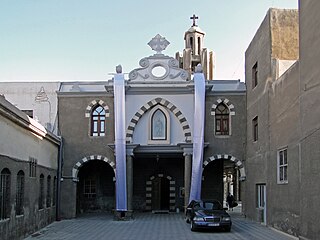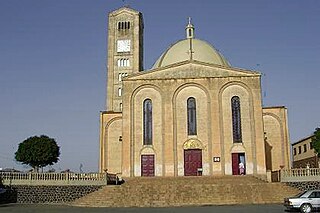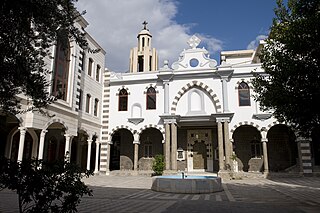The Syriac Catholic Patriarchal Exarchate of Basra, Iraq and the Gulf is an exarchate (Eastern Catholic missionary pre-diocesan jurisdiction) of the Syriac Catholic Church sui iuris (Antiochian Rite in Syriac language) for southern Iraq and the Gulf states, notably Kuwait.
It depends directly on the Syriac Catholic Patriarch of Antioch, without belonging to his or any other ecclesiastical province.
It was established in 1991 on territory previously without proper Ordinary of the particular church sui iuris.

The Syriac Catholic Church is an Eastern Catholic Christian jurisdiction originating in the Levant that uses the West Syriac Rite liturgy and has many practices and rites in common with the Syriac Orthodox Church. Being one of the twenty-three Eastern Catholic Churches, the Syriac Catholic Church is a self-governed sui iuris particular church, while it is in full communion with the Holy See and with the entirety of the Catholic Church.
Sui iuris also spelled sui juris, is a Latin phrase that literally means "of one's own right". It is used in both secular law and the Catholic Church's canon law. The term church sui iuris is used in the Catholic Code of Canons of the Eastern Churches (CCEO) to denote the autonomous churches in Catholic communion. The Catholic Church consists of 24 churches, including the Latin Church and 23 Eastern Catholic churches.

Catholics in Iraq follow several different rites, but in 2022, most (82%) are members of the Chaldean Catholic Church; about 17% belong to the Syrian Catholic Church, and the remainder are primarily Armenian, Greek and Latin-rite Catholics.

The Ethiopian Catholic Archeparchy of Addis Abeba, officially the Metropolitan sui iuris Archeparchy of Addis Abeba is the metropolitan see of the Ethiopian Catholic Church, a sui iuris metropolitan Eastern Catholic Church.
The Syriac Catholic Church, established in the second half of the 17th century as an Eastern Catholic offshoot of the Syriac Orthodox Church, had around a dozen dioceses in the eastern provinces of the Ottoman Empire in the 18th and 19th centuries. Three of these dioceses were ruined during the First World War in the Assyrian and Armenian massacres, and the 20th century also saw the growth of an important Syriac Catholic diaspora in America, Europe and Australasia. As of 2012 the Syriac Catholic Church has fifteen dioceses, mostly in the Middle East, and four patriarchal vicariates for the diaspora communities.

The Eritrean Catholic Archeparchy of Asmara, officially the Archeparchy of Asmara, more informally Asmara of the Eritreans, is the metropolitan see of the Eritrean Catholic Church, a sui iuris Eastern Catholic Church whose territory corresponds to that of the State of Eritrea in the Horn of Africa. It depends on the Roman Congregation for the Oriental Churches.
Melkite (Greek) Catholic Patriarchal Exarchate of Iraq is a Patriarchal exarchate of the Melkite Greek Catholic Church sui iuris (Byzantine Rite in Greek language for part of Iraq.
The Syriac Catholic Archeparchy of Mosul is a Syriac Catholic Church ecclesiastical territory or archeparchy in northern Iraq. It is not a metropolitan see and is immediately exempt to the Syriac Catholic Patriarch of Antioch and the Roman Congregation for the Oriental Churches, and not part of any ecclesiastical province. Its cathedral is the Syriac Catholic Cathedral in the episcopal see of Mosul.
The Chaldean Catholic Eparchy of Beirut is the sole eparchy of the Chaldean Catholic Church for all Lebanon.
The Chaldean Catholic Archeparchy of Ahvaz (or Ahwaz)(informally called Ahvaz of the Chaldeans) is a non-Metropolitan archeparchy (Eastern Catholic archdiocese) of the particular Chaldean Catholic Church sui iuris (Syro-Oriental Rite in Syriac language) in Ahvaz, Khuzestan Province, southwest Iran.
The Armenian Catholic Patriarchal Exarchate of Jerusalem and Amman is the missionary pre-diocesan jurisdiction of the Armenian Catholic Church sui iuris in the Holy Land (Palestine/Israel) and (Trans)Jordan.
The Armenian Catholic Patriarchal Exarchate of Syria (Syria of the Armenians) was a short-lived (1983-1997) pre-diocesan jurisdiction of the Armenian Catholic Church (Armenian Rite in Armenian language) in Syria.
The Chaldean Catholic Territory Dependent onthe Patriarch of Jerusalem is a missionary pre-diocesan jurisdiction of the Chaldean Catholic Church sui iuris covering the Holy land.
The Syriac Catholic Eparchy of Cairo is a Syriac Catholic Church ecclesiastical territory or eparchy of the Catholic Church in Egypt. It is immediately exempt to the Syriac Catholic Patriarch of Antioch, though not part of his or any other ecclesiastical province.
The Syriac Catholic Archeparchy of Homs(-Hama-Nabk) is a nominally Metropolitan Archeparchy of the Syriac Catholic Church sui iuris in Syria. It has no suffragans. Its seat is Holy Ghost Cathedral in Homs, Syria.

The Syriac Catholic Archeparchy of Damascus is a Syriac Catholic Church ecclesiastical territory or eparchy of the Catholic Church in Syria. While a metropolitan see, the Archeparchy of Damascus is without suffragans and is exempt directly to the Syriac Catholic Patriarchate of Antioch. It has its cathedral in the archepiscopal see and Syrian national capital Damascus.
The Syriac Catholic Patriarchal Exarchate of Jerusalem is a Patriarchal exarchate of the Syriac Catholic Church for Palestine and Jordan.

The Bulgarian Catholic Eparchy of Saint John XXIII of Sofia is an eparchy of the Bulgarian Greek Catholic Church which is a sui iuris ("autonomous") Eastern Catholic church based in Bulgaria. As a particular church of the Catholic Church, it is in full communion with the Holy See. The Church is organised as a single eparchy. Its liturgical usage is that of the Byzantine Rite in the Bulgarian language. It was elevated from an Apostolic Exarchate to a full eparchy by Pope Francis on 12 October 2019. The cathedral church of the eparchy is the Cathedral of the Dormition, in Bulgaria's capital Sofia. The incumbent eparch is Christo Proykov.
The Syriac Catholic Archeparchy of Baghdad is a Syriac Catholic Church ecclesiastical territory or archeparchy of the Catholic Church in Iraq. It is not a metropolitan see and is directly exempt to the Syriac Catholic Patriarch of Antioch, though not part of his or any other ecclesiastical province, and in Rome depends on the Congregation for the Oriental Churches.